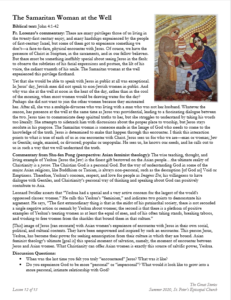
Biblical text: John 4:1-42
Fr. Lorenzo’s commentary: There are many privileges those of us living in the twenty-first century enjoy, and many hardships experienced by the people of first-century Israel, but some of them got to experience something we don’t—a face-to-face, physical encounter with Jesus. Of course, we have the presence of Christ in Scripture, in the sacraments, and in our fellow believers. But there must be something ineffably special about seeing Jesus in the flesh: to observe the subtleties of his facial expressions and posture, the lilt of his voice, the radiant warmth of his smile. The Samaritan woman at the well experienced this privilege firsthand.
Yet that she would be able to speak with Jesus in public at all was exceptional. In Jesus’ day, Jewish men did not speak to non-Jewish women in public. And why was she at the well at noon in the heat of the day, rather than in the cool of the morning, when most women would be drawing water for the day? Perhaps she did not want to join the other women because they mistreated her. After all, she was a multiple-divorcee who was living with a man who was not her husband. Whatever the reason, her presence at the well at the same time as Jesus was providential, leading to a fascinating dialogue between the two. Jesus tries to communicate deep spiritual truths to her, but she struggles to understand by taking his words too literally. She attempts to sidetrack him with discussions about the proper place to worship, but Jesus stays resolute in his purpose. The Samaritan woman is someone made in the Image of God who needs to come to the knowledge of the truth. Jesus is determined to make that happen through this encounter. I think this interaction points to what is true of each of us in our encounter with Christ. Jesus sees us for who we are—man or woman; Jew or Gentile; single, married, or divorced; popular or unpopular. He sees us, he knows our needs, and he calls out to us in such a way that we will understand the truth.
Commentary from Shu-fen Pong (perspective: Asian feminist theology): The wise teaching, thought, and living example of Yeshua (Jesus the Jew) is the finest gift bestowed on the Asian people…the ultimate reality of Christianity is a person. The Christian God is a personal God. But the way of understanding God in some of the major Asian religions, like Buddhism or Taoism, is always non-personal, such as the description [of God as] Void or Emptiness. Therefore, Yeshua’s concern, respect, and love for people as Imagines Dei, his willingness to have dialogue with Gentiles, and Christianity’s personal way of thinking and speaking about God can positively contribute to Asia.
Leonard Swidler asserts that “Yeshua had a special and a very active concern for the largest of the world’s oppressed classes: women.” He calls this Yeshua’s “feminism,” and indicates two points to demonstrate his argument. He says, “The first extraordinary thing is that in the midst of his patriarchal society, there is not recorded a single negative action or remark by Yeshua about women; the second is that there is a plethora of positive examples of Yeshua’s treating women as at least the equal of men, and of his often taking stands, breaking taboos, and working to free women from the shackles that bound them in that culture.”
[This] image of Jesus [can resonate] with Asian women’s experience of encounter with Jesus in their own social, political, and cultural contexts. They have been empowered and inspired by such an encounter. This person Jesus, Yeshua, has become their power for seeking emancipation from their culture in which they are bound. Asian feminist theology’s ultimate [goal is] this special moment of salvation, namely, the moment of encounter between Jesus and Asian women. What Christianity can offer Asian women is exactly this source of salvific power, Yeshua.
Discussion Questions:
- When was the last time you felt you truly “encountered” Jesus? What was it like?
- Do you experience God to be more “personal” or “impersonal”? What would it look like to grow into a more personal, intimate relationship with God?



Comments are closed.